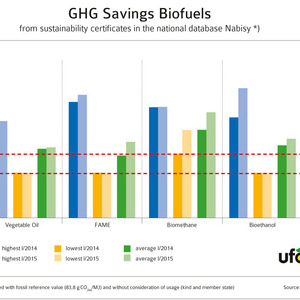Germany's obligation to reduce GHGs drives competition

July 13, 2015
BY UFOP
With an average greenhouse gas (GHG) reduction of 60 percent, the competition for the highest GHG efficiency is starting. This was confirmed in the first quarterly report by the German Federal Office for Food and Agriculture (BLE). The calculation is based on the sustainability certificates entered into the “Nabisy” database.
On Jan. 1, Germany became the first EU member state to introduce the obligation to reduce GHGs, starting with a quota of 3.5 percent by 2016, 4 percent from 2017 and 6 percent by 2020. The information provided by the BLE confirms the expectations held by the Union for the Promotion of Oil and Protein Plants (UFOP) that the legal requirements from the Renewable Energy Directive, which stipulates a GHG reduction of 35 percent currently and 50 percent from 2017 as a condition for market access, would be greatly exceeded.
On average, the GHG savings is already more than 60 percent. This results in a reduction in the biofuels and therefore also biomass raw materials required to meet the obligation to reduce GHGs. This is an efficiency gain in two senses, which is only present in this form for biofuels. Biofuels made from oil seed or grain in particular must face new competitive conditions as well as extensive certification requirements. UFOP emphasizes that this is an outstanding unique feature in the bioeconomy sector compared with the material use of renewable raw materials.
Advertisement
Advertisement
Advertisement
Advertisement
Related Stories
The U.S. Department of Commerce has disbanded an advisory committee that provided the agency with private sector advice aimed at boosting the competitiveness of U.S. renewable energy and energy efficiency exports, including ethanol and wood pellets.
Iowa’s Renewable Fuels Infrastructure Program on March 25 awarded nearly $3 million in grants to support the addition of E15 at 111 retail sites. The program also awarded grants to support two biodiesel infrastructure projects.
Effective April 1, Illinois’ biodiesel blend requirements have increased from B14 to B17. The increase was implemented via a bipartisan bill passed in 2022, according to the Iowa Soybean Association.
Agriculture Secretary Brooke Rollins on March 31 visited Elite Octane LLC, a 155 MMgy ethanol plant in Atlantic, Iowa, to announce the USDA will release $537 million in obligated funding under the Higher Blends Infrastructure Incentive Program.
The U.S. EPA on March 24 asked the U.S. District Court for the District of Columbia to dismiss a lawsuit filed by biofuel groups last year regarding the agency’s failure to meet the statutory deadline to promulgate 2026 RFS RVOs.
Upcoming Events










